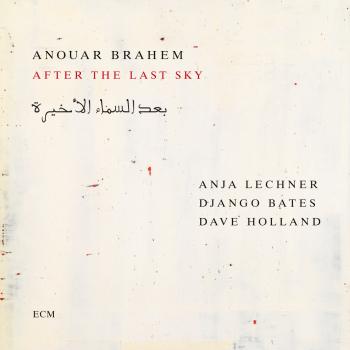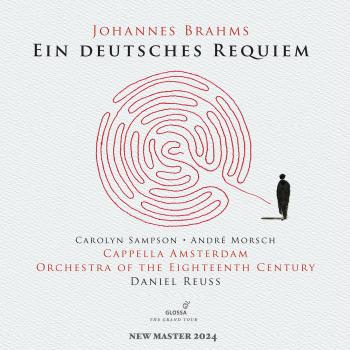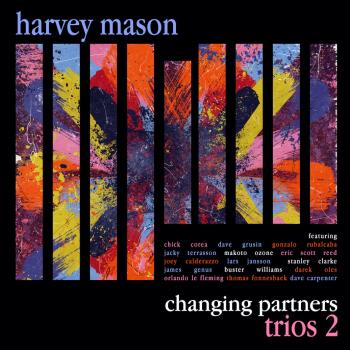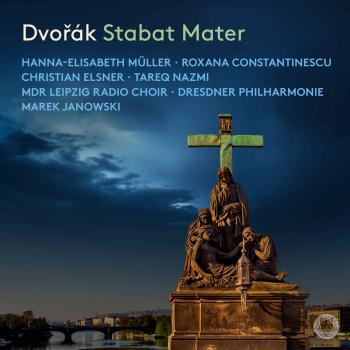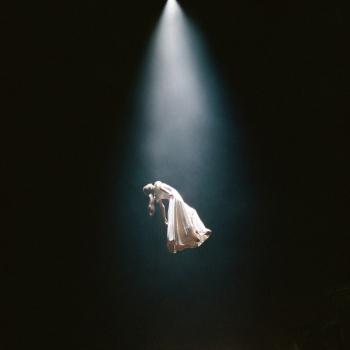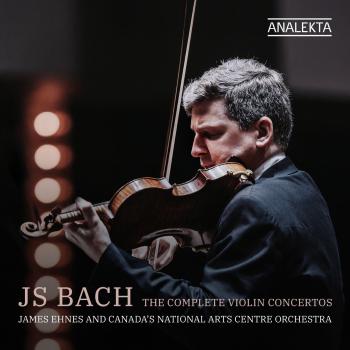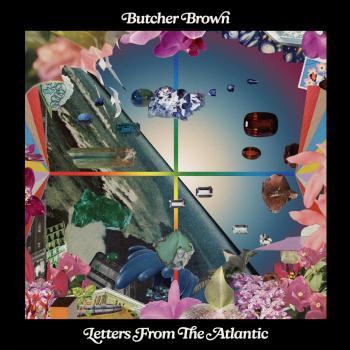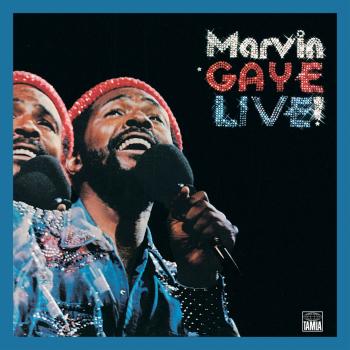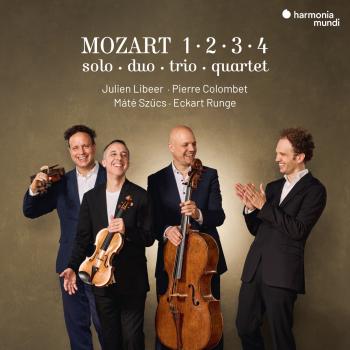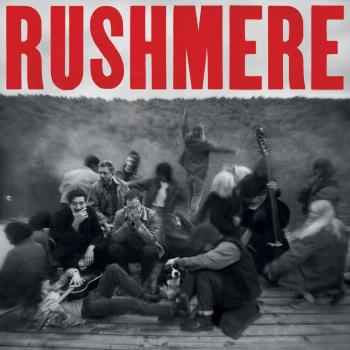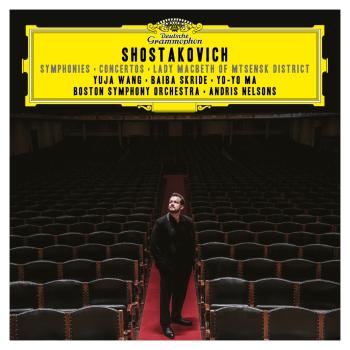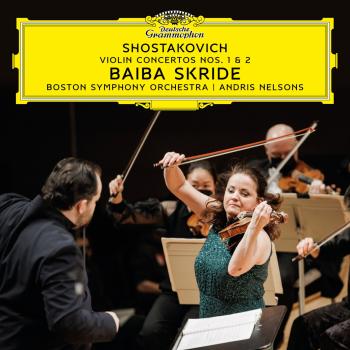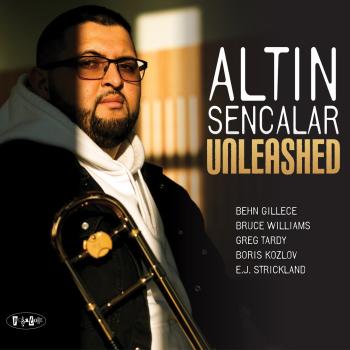
Quando l'amore è sensualità (Original Motion Picture Soundtrack / Remastered 2022) Ennio Morricone
Album info
Album-Release:
2022
HRA-Release:
11.11.2022
Label: Decca (UMO) Classics (CAM)
Genre: Soundtrack
Subgenre: Film
Artist: Ennio Morricone
Composer: Ennio Morricone (1928-2020)
Album including Album cover
I`m sorry!
Dear HIGHRESAUDIO Visitor,
due to territorial constraints and also different releases dates in each country you currently can`t purchase this album. We are updating our release dates twice a week. So, please feel free to check from time-to-time, if the album is available for your country.
We suggest, that you bookmark the album and use our Short List function.
Thank you for your understanding and patience.
Yours sincerely, HIGHRESAUDIO
- 1 Quando l'amore è sensualità (From "Quando l'amore è sensualità" / Remastered 2022) 04:09
- 2 Canzone per Donatella (From "Quando l'amore è sensualità" / Remastered 2022) 02:58
- 3 Vie-ni (From "Quando l'amore è sensualità" / Remastered 2022) 05:09
- 4 Giochi Naif (From "Quando l'amore è sensualità" / Remastered 2022) 05:12
- 5 Accettazione di una violenza (From "Quando l'amore è sensualità" / Remastered 2022) 02:01
- 6 Luce chiara per vergine "curve oscure" (From "Quando l'amore è sensualità" / Remastered 2022) 05:04
- 7 Tarantella Naif (From "Quando l'amore è sensualità" / Remastered 2022) 01:38
- 8 Strano collage da "camera" (From "Quando l'amore è sensualità" / Remastered 2022) 03:12
- 9 Nascosta nell'ombra (From "Quando l'amore è sensualità" / Remastered 2022) 01:09
- 10 Saltarello Naif (From "Quando l'amore è sensualità" / Remastered 2022) 04:45
- 11 Soluzione borghese (From "Quando l'amore è sensualità" / Remastered 2022) 02:57
- 12 Quando l'amore è sensualità #2 (From "Quando l'amore è sensualità" / Remastered 2022) 05:16
- 13 Luce chiara per vergine "curve oscure" #2 (From "Quando l'amore è sensualità" / Remastered 2022) 04:27
- 14 Radiolina (From "Quando l'amore è sensualità" / Remastered 2022) 01:10
- 15 Sensualità (From "Quando l'amore è sensualità" / Remastered 2022) 00:55
- 16 Giochi Naif #2 (From "Quando l'amore è sensualità" / Remastered 2022) 03:49
- 17 Quando l'amore è sensualità (Pianoforte solo) (From "Quando l'amore è sensualità" / Remastered 2022) 01:50
- 18 Vie-ni (Alt. Take) (From "Quando l'amore è sensualità" / Remastered 2022) 04:36
- 19 Tarantella Naif #2 (From "Quando l'amore è sensualità" / Remastered 2022) 01:38
- 20 Giochi Naif #3 (From "Quando l'amore è sensualità" / Remastered 2022) 05:18
- 21 Quando l'amore è sensualità #3 (From "Quando l'amore è sensualità" / Remastered 2022) 04:03
- 22 Canzone per Donatella #2 (From "Quando l'amore è sensualità" / Remastered 2022) 03:23
- 23 Giallo per due pianoforti (From "Quando l'amore è sensualità" / Remastered 2022) 05:45
Info for Quando l'amore è sensualità (Original Motion Picture Soundtrack / Remastered 2022)
Undiscovered Morricone Soundtrack, Newly Remastered! Quando l'amore è sensualità (1973) is one of the undiscovered gems of the production of Ennio Morricone. Still unpublished in its entirety, this score is the manifesto of the "Morricone Segreto" concept. With its tonal experiments and compositional complexity, it shows the most obscure, dark-tinged, and psychedelic side of the Maestro and his unbridled creativity.
The score masterfully mirrors the lustful bourgeois hypocrisy portrayed in the cult film directed by Vittorio De Sisti, thanks to a striking contrast between obsessive and repetitive sounds (representing the male fury) and uplifting, crystalline and ethereal elements (symbolizing the feminine innocence).
Edda Dell'Orso, the longtime "crystal voice" of Morricone (best known for being featured in the score of Sergio Leone's A Fistful of Dynamite) is featured on seven tracks, giving an essential contribution to the uniqueness of the soundtrack: her whimsical whispered vocals enrich tracks like "Luce chiara per vergine" and "Curve oscure" with mystery and fleshliness.
The third track, the enigmatic and haunting "Vie-Ni" (one of the most loved pieces from "Morricone Segreto") is representative of what to expect from the soundtrack: a disturbing and mysterious synthesizer plays on a tribal drumbeat, soon to be interrupted by a children's choir obsessively repeating the title's two syllables. These eerie, creepy childish voices, introduced in previous works, here find an even more obsessive use: they represent one of Morricone's trademark elements, as well as one of the traits that have made Italian soundtracks from the 1970s so much appreciated and recognizable in the world. The soundtrack also features "Nascosta nell'ombra," a psych-prog cut featuring a prominent wah wah guitar and an electric organ, which represents another nugget from the much sought-after and acclaimed groovy repertoire of the Maestro.
Digitally remastered
Ennio Morricone
was born in Rome on 10 November 1928. His long artistic career includes a wide range of composition genres, from absolute concert music to applied music, working as orchestrator, conductor and composer for theatre, radio and cinema. In 1946, Ennio received his trumpet diploma and in 1954 he received his diploma in Composition at the Conservatorio di Santa Cecilia under the guidance of Goffredo Petrassi. He wrote his first concert works at the end of the 1950s, then worked as arranger for RAI (the Italian broadcasting company) and RCA-Italy. He started his career as a film music composer in 1961 with the film Il Federale directed by Luciano Salce. World fame followed through the Sergio Leone westerns: A Fistful of Dollars (1964), For a Few Dollars More (1965), The Good, The Bad and The Ugly (1966), Once Upon a Time in The West (1968) and A Fistful of Dynamite (1971).
In 1965, Morricone joined the improvisation group Nuova Consonanza. Since 1960, Morricone has scored over 450 films working with many Italian and international directors including Sergio Leone, Gillo Pontecorvo, Pier Paolo Pasolini, Bernardo Bertolucci, Giuliano Montaldo, Lina Wertmuller, Giuseppe Tornatore, Brian De Palma, Roman Polanski, Warren Beatty, Adrian Lyne, Oliver Stone, Margarethe Von Trotta, Henry Verneuil, Pedro Almodovar and Roland Joffè. His most famous films (other than the Italian westerns) include: The Battle of Algiers; Sacco and Vanzetti; Cinema Paradiso; The Legend of 1900, Malena; The Untouchables; Once Upon a Time in America; The Mission and U-Turn. His absolute music production includes over 100 pieces composed from 1946 to the present day. Titles include Concerto per Orchestra n.1 (1957); Frammenti di Eros (1985); Cantata per L’Europa (1988); UT, per tromba, archi e percussioni (1991); Ombra di lontana presenza (1997); Voci dal silenzio (2002); Sicilo ed altri frammenti (2007); Vuoto d’anima piena (2008). In 2001, Ennio Morricone began a period of intense concert activity, conducting his film music and concert works for symphony orchestra and polyphonic choir in more than 100 concerts across Europe, Asia, USA, Central and South America.
During his long career, Ennio Morricone has also received many awards. As well as the Golden Lion and the honorary Oscar he was awarded in 2003, he has been presented with eight Nastri D’argento, five BAFTAs, five Oscar nominations, seven David Di Donatellos, three Golden Globes, one Grammy Award and one European Film Award. In 2009, the then President of the French Republic, Nicolas Sarkozy, also signed a decree appointing Morricone to the rank of Knight in the Order of the Legion of Honor.
In the recording field, Morricone has received 27 gold discs, seven platinum discs, three Golden Plates and the Critica discografica award for the music of the film Il Prato. The soundtrack from the film The Good, The Bad and The Ugly was inducted into the Grammy Hall of Fame in 2009 while Morricone himself was awarded the prestigious Polar Music prize the following year.
His more recent works include scores for the television series Karol and The End of a Mystery, 72 Meters and Fateless. In the 21st century, Morricone’s music has been reused countless times for television and in movies including Quentin Tarantino’s Kill Bill (2003), Death Proof (2007), Inglourious Basterds (2009) and Django Unchained (2012). In 2007, Morricone received the Academy Honorary Award “for his magnificent and multifaceted contributions to the art of film music”.
In November 2013, he began a world tour to coincide with the 50th anniversary of his film music career and performed in locations such as the Crocus City Hall in Moscow, Santiago, Chile, Berlin, Germany (O2 World), Budapest, Hungary, and Vienna’s Stadhalle. On 6 February 2014, Riccardo Mutti conducted the Chicago Symphony Orchestra performing Morricone’s Voices from the Silence, a cantata Morricone composed in response to 9/11 to give voice to innocent victims. In Autumn 2014, Morricone participated in the recording of a documentary about himself by Giuseppe Tornatore, which is yet to be released.
His European tour resumed from February 2015 to March 2015, with 20 concerts in 12 countries, in Europe’s largest arenas, such as the O2 in London and the Ziggo Dome in Amsterdam. Playing to a total of 150,000 spectators and with most of the shows sold out, Maestro Morricone’s My Life in Music European Arena Tour was a resounding success.
On 12 June 2015, Morricone conducted a mass composed in dedication to Pope Francis. It was commissioned by the Jesuit Order to commemorate the 200 year anniversary of the recongregation of the Jesuit Order at the Jesuit Church in Rome.
2015 also saw Morricone collaborate with Quentin Tarantino on an original soundtrack for the very first time. On December 7th 2015, The Hateful Eight had its world premiere followed by a Golden Globe nomination in the Best Original Score category the very next day.
Giuseppe Tornatore’s The Correspondence, with an original soundtrack composition by Morricone, is being released on January 15th 2016
This album contains no booklet.

